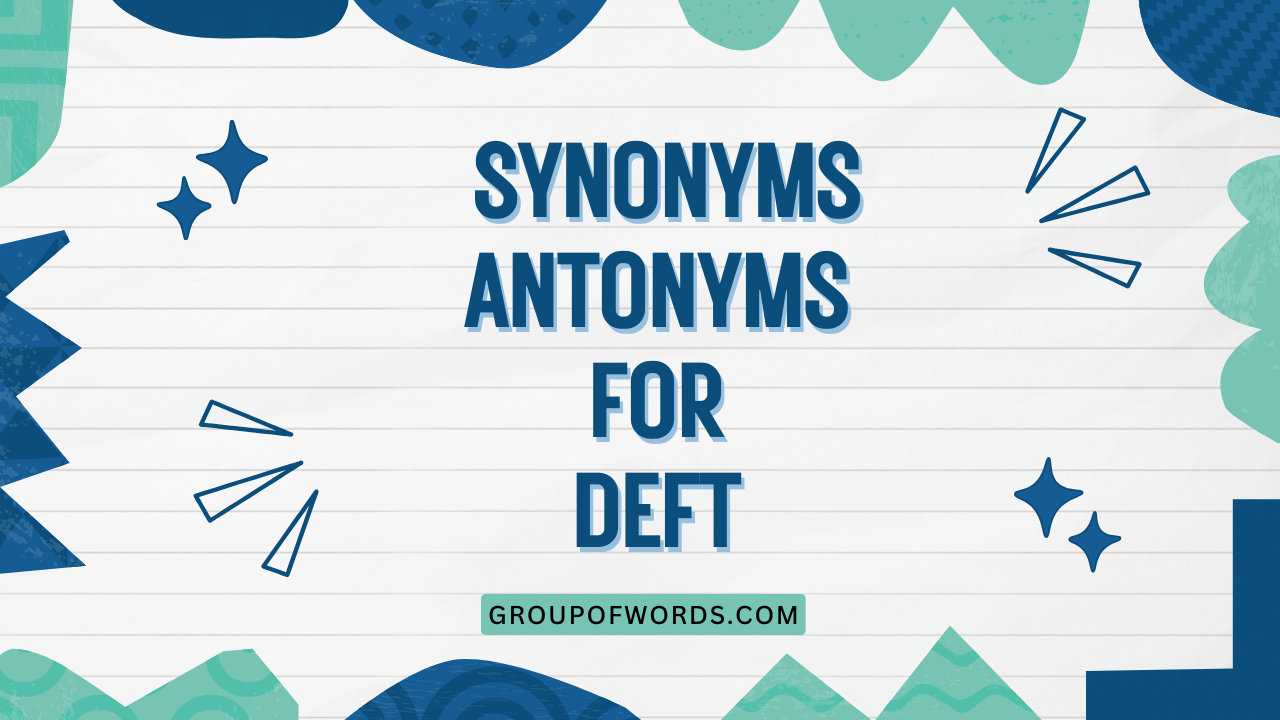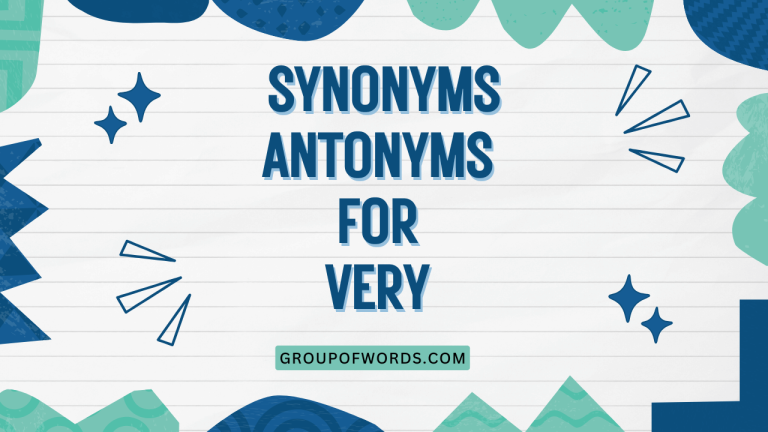Mastering ‘Deft’: Synonyms, Antonyms, and Usage Guide
Understanding synonyms and antonyms is crucial for enhancing vocabulary, improving writing skills, and achieving nuanced communication. This article focuses on the word “deft,” exploring its various synonyms and antonyms, providing examples of their usage, and offering practical exercises to solidify your understanding.
Whether you’re a student, a professional writer, or simply an English language enthusiast, this comprehensive guide will equip you with the knowledge to use “deft” and its related terms with confidence and precision.
This article will benefit anyone looking to expand their vocabulary, improve their writing, or gain a deeper understanding of the English language. By exploring synonyms and antonyms for “deft,” readers can learn to express themselves more accurately and effectively, adding richness and variety to their communication.
Table of Contents
- Definition of “Deft”
- Structural Breakdown
- Types and Categories of Synonyms & Antonyms
- Examples of Synonyms and Antonyms for “Deft”
- Usage Rules for “Deft” and Related Words
- Common Mistakes When Using “Deft”
- Practice Exercises
- Advanced Topics
- Frequently Asked Questions
- Conclusion
Definition of “Deft”
The word “deft” is an adjective that describes someone who is skillful and quick in their movements. It implies a natural ability or learned expertise in handling objects or performing tasks with precision and grace.
“Deft” often suggests a combination of speed, accuracy, and elegance in execution.
Classification: Adjective
Function: To describe a noun (person, object, or action) as being skillful and quick.
Contexts: “Deft” is commonly used in descriptions of physical skills, such as cooking, surgery, craftsmanship, and sports. It can also be applied metaphorically to describe intellectual or artistic skills.
Structural Breakdown
The word “deft” doesn’t have a complex structural breakdown. It’s a relatively short word with a straightforward meaning.
However, understanding its etymology and how it relates to other words can provide a deeper appreciation for its usage.
Origin: “Deft” comes from the Middle English word “daft,” which originally meant “gentle” or “meek.” Over time, the meaning evolved to suggest skillfulness and dexterity. The connection might seem counterintuitive, but the idea is that someone who is “deft” handles things with a gentle, careful touch, leading to successful execution.
Morphology: “Deft” is a simple morpheme, meaning it cannot be broken down into smaller meaningful units. It doesn’t have common prefixes or suffixes that significantly alter its meaning.
Types and Categories of Synonyms & Antonyms
When considering synonyms and antonyms for “deft,” it’s helpful to categorize them based on nuance and context. This allows for a more precise selection of the most appropriate word.
Synonyms
Synonyms for “deft” can be grouped into several categories:
- Skillful: Emphasizes general competence and ability.
- Dexterous: Highlights physical coordination and agility, especially with the hands.
- Adept: Suggests proficiency and mastery in a particular skill.
- Proficient: Indicates competence and expertise gained through practice.
- Nimble: Emphasizes quickness and agility in movement.
- Agile: Similar to nimble, but can also refer to mental quickness.
- Handy: Implies practical skill and resourcefulness.
- Expert: Conveys a high level of knowledge and skill.
- Masterful: Suggests exceptional skill and control.
- Artful: Highlights creativity and ingenuity in skill.
Antonyms
Antonyms for “deft” also fall into distinct categories:
- Clumsy: Emphasizes awkwardness and lack of coordination.
- Awkward: Suggests a lack of grace and ease in movement.
- Inept: Indicates a general lack of skill or competence.
- Unskilled: Highlights a lack of training or experience.
- Maladroit: Emphasizes clumsiness and lack of tact.
- Bumbling: Suggests incompetence and a tendency to make mistakes.
- Ham-fisted: Describes someone who is heavy-handed and lacks finesse.
- Incompetent: Conveys a lack of the necessary skills or qualifications.
- Gauche: Highlights social awkwardness and a lack of grace.
- Artless: Lacking in skill or finesse; also, without guile or deception (depending on context).
Examples of Synonyms and Antonyms for “Deft”
To illustrate the different shades of meaning, let’s examine examples of “deft” used in sentences, along with its synonyms and antonyms.
Synonyms Examples
The following table provides examples of “deft” and its synonyms used in sentences. Note how each synonym conveys a slightly different nuance.
| Original Sentence (with “Deft”) | Synonym | Sentence with Synonym |
|---|---|---|
| The surgeon made a deft incision. | Skillful | The surgeon made a skillful incision. |
| The pianist’s deft fingers danced across the keys. | Dexterous | The pianist’s dexterous fingers danced across the keys. |
| She was deft at handling difficult customers. | Adept | She was adept at handling difficult customers. |
| He became deft at repairing watches after years of practice. | Proficient | He became proficient at repairing watches after years of practice. |
| The cat made a deft leap onto the fence. | Nimble | The cat made a nimble leap onto the fence. |
| The negotiator was deft in finding common ground. | Agile | The negotiator was agile in finding common ground. |
| He was deft with tools, always able to fix things around the house. | Handy | He was handy with tools, always able to fix things around the house. |
| The chef was deft in his preparation of the delicate sauce. | Expert | The chef was an expert in his preparation of the delicate sauce. |
| The artist displayed a deft touch in her brushstrokes. | Masterful | The artist displayed a masterful touch in her brushstrokes. |
| The con artist used deft maneuvers to trick his victims. | Artful | The con artist used artful maneuvers to trick his victims. |
| With a deft flick of the wrist, the magician made the coin disappear. | Quick | With a quick flick of the wrist, the magician made the coin disappear. |
| The bartender was deft at mixing cocktails. | Skilled | The bartender was skilled at mixing cocktails. |
| The surgeon’s deft movements saved the patient’s life. | Precise | The surgeon’s precise movements saved the patient’s life. |
| She was deft at navigating the complex bureaucracy. | Efficient | She was efficient at navigating the complex bureaucracy. |
| The thief was deft at picking pockets. | Sleight-of-hand | The thief used sleight-of-hand to pick pockets. |
| The craftsman was deft in his woodworking. | Talented | The craftsman was talented in his woodworking. |
| The dancer was deft in her movements. | Graceful | The dancer was graceful in her movements. |
| He was deft at managing his finances. | Astute | He was astute at managing his finances. |
| The programmer was deft at writing code. | Competent | The programmer was competent at writing code. |
| The journalist was deft at uncovering the truth. | Resourceful | The journalist was resourceful at uncovering the truth. |
| The chef was deft at plating the food. | Elegant | The chef was elegant at plating the food. |
| The quarterback was deft at throwing the football. | Accurate | The quarterback was accurate at throwing the football. |
| She was deft at solving complex problems. | Ingenious | She was ingenious at solving complex problems. |
Antonyms Examples
The following table illustrates the use of antonyms for “deft,” highlighting the contrast in meaning.
| Original Sentence (with “Deft”) | Antonym | Sentence with Antonym |
|---|---|---|
| The surgeon made a deft incision. | Clumsy | The surgeon made a clumsy incision. |
| The pianist’s deft fingers danced across the keys. | Awkward | The pianist’s awkward fingers fumbled across the keys. |
| She was deft at handling difficult customers. | Inept | She was inept at handling difficult customers. |
| He became deft at repairing watches after years of practice. | Unskilled | He remained unskilled at repairing watches despite years of trying. |
| The cat made a deft leap onto the fence. | Maladroit | The cat made a maladroit attempt to leap onto the fence, falling short. |
| The negotiator was deft in finding common ground. | Bumbling | The negotiator was bumbling and made the situation worse. |
| He was deft with tools, always able to fix things around the house. | Ham-fisted | He was ham-fisted with tools, often breaking things instead of fixing them. |
| The chef was deft in his preparation of the delicate sauce. | Incompetent | The chef was incompetent, ruining the delicate sauce. |
| The artist displayed a deft touch in her brushstrokes. | Gauche | The artist displayed a gauche and clumsy touch in her brushstrokes. |
| The con artist used deft maneuvers to trick his victims. | Artless | The con artist used artless attempts to trick his victims, failing miserably. |
| With a deft flick of the wrist, the magician made the coin disappear. | Clumsily | With a clumsily executed flick of the wrist, the magician dropped the coin. |
| The bartender was deft at mixing cocktails. | Awkwardly | The bartender awkwardly spilled ingredients while mixing cocktails. |
| The surgeon’s deft movements saved the patient’s life. | Careless | The surgeon’s careless movements endangered the patient’s life. |
| She was deft at navigating the complex bureaucracy. | Inefficient | She was inefficient at navigating the complex bureaucracy. |
| The thief was deft at picking pockets. | Clumsy | The thief was too clumsy to pick pockets successfully. |
| The craftsman was deft in his woodworking. | Unskilled | The craftsman was unskilled in his woodworking. |
| The dancer was deft in her movements. | Awkward | The dancer was awkward in her movements. |
| He was deft at managing his finances. | Imprudent | He was imprudent at managing his finances. |
| The programmer was deft at writing code. | Incompetent | The programmer was incompetent at writing code. |
| The journalist was deft at uncovering the truth. | Ineffective | The journalist was ineffective at uncovering the truth. |
| The chef was deft at plating the food. | Messy | The chef was messy at plating the food. |
| The quarterback was deft at throwing the football. | Inaccurate | The quarterback was inaccurate at throwing the football. |
| She was deft at solving complex problems. | Incapable | She was incapable of solving complex problems. |
Contextual Examples
This table displays how the choice of synonym or antonym can depend heavily on context. Consider the subtle differences in meaning.
| Context | Original Sentence (with “Deft”) | Synonym/Antonym | Sentence with Synonym/Antonym |
|---|---|---|---|
| Surgery | The surgeon made a deft incision. | Precise/Clumsy | The surgeon made a precise incision. / The surgeon made a clumsy incision. |
| Music | The pianist’s deft fingers danced across the keys. | Dexterous/Awkward | The pianist’s dexterous fingers danced across the keys. / The pianist’s awkward fingers fumbled across the keys. |
| Customer Service | She was deft at handling difficult customers. | Adept/Inept | She was adept at handling difficult customers. / She was inept at handling difficult customers. |
| Repair Work | He became deft at repairing watches after years of practice. | Proficient/Unskilled | He became proficient at repairing watches after years of practice. / He remained unskilled at repairing watches despite years of trying. |
| Negotiation | The negotiator was deft in finding common ground. | Agile/Bumbling | The negotiator was agile in finding common ground./ The negotiator was bumbling and made the situation worse. |
Usage Rules for “Deft” and Related Words
Using “deft” and its related words correctly requires attention to context and nuance. Here are some guidelines:
- “Deft” vs. “Dexterous”: While both imply skill, “deft” often suggests a more refined and elegant skill, whereas “dexterous” focuses on physical coordination, especially with the hands.
- “Deft” vs. “Adept”: “Adept” implies a more general proficiency, while “deft” suggests a specific skill performed with speed and precision.
- Choosing the Right Antonym: Consider the specific aspect of skill you want to negate. “Clumsy” emphasizes physical awkwardness, while “inept” suggests a general lack of competence.
- Figurative Usage: “Deft” can be used metaphorically to describe intellectual or artistic skills, but ensure the context is appropriate. For example, “a deft negotiator” or “a deft writer.”
Common Mistakes When Using “Deft”
Several common mistakes can occur when using “deft” and its related terms. Being aware of these errors can help you avoid them.
| Incorrect | Correct | Explanation |
|---|---|---|
| “He was a deft runner, but not very strong.” | “He was a fast runner, but not very strong.” | “Deft” implies skill and precision, not just speed. “Fast” is more appropriate here. |
| “She was deft in her emotions.” | “She was skilled at managing her emotions.” | “Deft” usually applies to physical or technical skills, not emotions. |
| “The clumsy surgeon made a deft incision.” | “The inexperienced surgeon made a clumsy incision.” | “Deft” and “clumsy” are antonyms and cannot be used together to describe the same action. |
| “He was deft at understanding the complex theorem, showing his dexterity.” | “He was deft at understanding the complex theorem, showing his acumen.” | “Dexterity” refers to physical skill, “acumen” is better suited for intellectual skill. |
| “The inept artist created a very deft sculpture.” | “The talented artist created a very deft sculpture.” | “Inept” and “deft” are antonyms and shouldn’t be used to describe the same person’s abilities in the same context. |
Practice Exercises
Test your understanding of “deft” and its synonyms/antonyms with these exercises.
Exercise 1: Synonym Selection
Choose the best synonym for “deft” in each sentence.
| Question | Options | Answer |
|---|---|---|
| The magician’s ______ hands amazed the audience. | a) clumsy b) deft c) awkward d) inept | b) deft |
| She was ______ at playing the violin. | a) unskilled b) deft c) maladroit d) incompetent | b) deft |
| The ______ carpenter crafted intricate furniture. | a) bumbling b) deft c) gauche d) artless | b) deft |
| The ______ chef prepared a gourmet meal in minutes. | a) inept b) deft c) clumsy d) awkward | b) deft |
| He was ______ at solving complex puzzles. | a) unskilled b) deft c) ham-fisted d) incompetent | b) deft |
| The ______ dancer moved with grace and precision. | a) clumsy b) deft c) awkward d) gauche | b) deft |
| The ______ negotiator secured a favorable deal. | a) inept b) deft c) bumbling d) maladroit | b) deft |
| The ______ programmer wrote elegant code. | a) unskilled b) deft c) ham-fisted d) artless | b) deft |
| The ______ surgeon performed a life-saving operation. | a) clumsy b) deft c) awkward d) incompetent | b) deft |
| She was ______ at managing her finances. | a) inept b) deft c) bumbling d) gauche | b) deft |
Exercise 2: Antonym Selection
Choose the best antonym for “deft” in each sentence.
| Question | Options | Answer |
|---|---|---|
| Unlike his ______ brother, he was quite clumsy. | a) deft b) agile c) skillful d) handy | a) deft |
| Her ______ handling of the situation made things worse. | a) deft b) adept c) proficient d) artful | a) deft |
| The ______ repairman broke more than he fixed. | a) deft b) dexterous c) handy d) masterful | a) deft |
| His ______ attempt to impress her failed miserably. | a) deft b) nimble c) agile d) expert | a) deft |
| The ______ waiter spilled the drinks on the customer. | a) deft b) skillful c) adept d) proficient | a) deft |
| She was ______ at solving the problem, unlike her colleague. | a) deft b) expert c) masterful d) artful | a) deft |
| The ______ dancer stumbled during the performance. | a) deft b) dexterous c) handy d) masterful | a) deft |
| His ______ management of the company led to its downfall. | a) deft b) nimble c) agile d) expert | a) deft |
| The ______ programmer introduced several bugs into the system. | a) deft b) skillful c) adept d) proficient | a) deft |
| He was ______ at handling the delicate equipment, causing it to break. | a) deft b) expert c) masterful d) artful | a) deft |
Exercise 3: Sentence Completion
Complete the sentences with the most appropriate word (deft, dexterous, inept, clumsy).
| Question | Answer |
|---|---|
| The ______ juggler kept all five balls in the air with ease. | deft |
| Her ______ fingers quickly assembled the intricate model. | dexterous |
| He was so ______ that he tripped over his own feet. | clumsy |
| The ______ mechanic couldn’t even change a tire. | inept |
| The ______ surgeon performed the delicate operation flawlessly. | deft |
| Her ______ handling of the crisis averted a disaster. | deft |
| He was ______ at repairing watches, a skill passed down through generations. | deft |
| The ______ dancer moved with grace and precision, captivating the audience. | deft |
| She was ______ at navigating the complex legal system, securing a favorable outcome for her client. | deft |
| The ______ programmer wrote clean, efficient code that solved the problem perfectly. | deft |
Advanced Topics
For advanced learners, consider these more complex aspects:
- Etymological Connections: Explore the historical evolution of “deft” and its relationship to other words in Germanic languages.
- Literary Usage: Analyze how “deft” and its synonyms are used in literature to create vivid imagery and characterization.
- Cross-Cultural Comparisons: Investigate how similar concepts are expressed in other languages and cultures.
Frequently Asked Questions
- What is the difference between “deft” and “skillful”?
While both terms describe competence, “deft” implies a specific type of skill characterized by quickness, precision, and grace. “Skillful” is a more general term that simply indicates competence in a particular area.
- Can “deft” be used to describe abstract concepts?
Yes, “deft” can be used metaphorically to describe intellectual or artistic skills. For example, you might say someone is a “deft negotiator” or a “deft writer” to indicate their skill and precision in those areas.
- Is “deft” a formal or informal word?
“Deft” is generally considered a formal word, suitable for academic writing, professional communication, and literary contexts. In casual conversation, simpler synonyms like “skillful” or “handy” might be more appropriate.
- What are some common collocations with “deft”?
Common collocations with “deft” include “deft touch,” “deft hands,” “deft movements,” and “deft handling.” These phrases emphasize the skill and precision involved.
- How can I improve my understanding of synonyms and antonyms in general?
To improve your understanding of synonyms and antonyms, read widely, use a thesaurus regularly, and pay attention to the context in which words are used. Practice using new words in your own writing and speaking to solidify your knowledge.
- What is the origin of the word “deft”?
The word “deft” comes from the Middle English word “daft,” which originally meant “gentle” or “meek.” Over time, the meaning evolved to suggest skillfulness and dexterity, likely because gentle and careful handling leads to better results.
- Is there a noun form of “deft”?
While there isn’t a direct noun form of “deft,” you can use related nouns like “dexterity,” “skill,” or “adroitness” to describe the quality of being deft.
- How can I remember the difference between “deft” and “dexterous”?
Think of “dexterous” as specifically relating to the hands (the Latin root “dexter” means “right hand”). “Deft” is a broader term for skill that can apply to more than just hand movements, but still suggests precision and grace.
Conclusion
Mastering the nuances of words like “deft” and understanding their synonyms and antonyms is essential for effective communication. This article has provided a comprehensive overview of “deft,” exploring its definition, structural breakdown, various synonyms and antonyms, usage rules, common mistakes, and practice exercises.
By incorporating these insights into your vocabulary and writing, you can express yourself with greater precision and clarity. Remember to pay attention to context, consider the subtle differences between related words, and practice using new terms in your own communication.
With consistent effort, you can significantly enhance your English language skills and become a more confident and articulate communicator.






